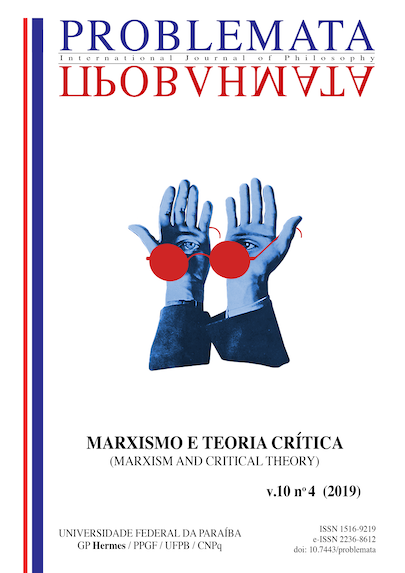ERNST BLOCH: A SCHELLINGIAN MARX?
REFLECTIONS ON THE ASSUMPTIONS OF AN ENGAGED PHILOSOPHY
DOI:
https://doi.org/10.7443/problemata.v10i4.49677Keywords:
Nature, Future, Criticism, Open systemAbstract
The influence of F. Schelling on the theory of Ernst Bloch is unquestionable. However, hypotheses, such as those of Jürgen Habermas, suggest that this influence would have undermined the critical character of his theory, inasmuch as it would have led the author to overestimate a kind of speculative materialism, to the detriment of the conscious and intentional intervention of human praxis. Therefore, Bloch could be nominated as a Schelling Marxist, that is, closer to Schelling than to Marx. Here we intend to indicate that, on the contrary, Bloch enlarged and deepened the critical- revolutionary character of his theory by approaching Schelling's philosophy, namely his understand- ing of nature in becoming, and the corresponding conception of knowledge as an open system. Strengthened by Schelling's critical appropriation, Bloch's theory contributes in a unique way to the visualization of a theoretical horizon where, without falling into the absolutization of the subject, hope and engagement become permanently possible. Bloch, then, is a Schellingian Marx.
Downloads
References
______ Geist der Utopie. Zweite Fassung. Gesamtausgabe, Bd. 3. Frankfurt a. M.: Suhrkamp, 1977a.
______. Das Prinzip Hoffnung. Gesamtausgabe, Bd. 5, Kap. 1-32. Frankfurt a. M: Suhrkamp, 1977. [Ed. bras.: O princípio esperança, Vol. I. Trad. Nélio Schneider. Rio de Janeiro: EdUERJ; Contraponto, 2005).
______. Das Prinzip Hoffnung. Gesamtausgabe, Bd. 5, Kap. 43-55. Frankfurt a. M: Suhrkamp, 1977b. [Ed. bras.: O princípio esperança, Vol. III. Trad. Nélio Schneider. Rio de Janeiro: EdUERJ; Contraponto, 2006].
______. Experimentum mundi. Gesamtausgabe, Bd. 15. Frankfurt a. M.: Suhrkamp, 1975.
HABERMAS, J. Ein marxisitischer Schelling: zu Ernst Bloch spekulativen Materialismus. In: ______. Theorie und Praxis: Sozialphilosophische Studien. Neuwiend; Berlin: Luchterhand, 1967, p. 336-351.
HORKHEIMER, M. Teoria tradicional e teoria crítica. São Paulo: Abril Cultural, 1975. (Os Pensadores).
MARCUSE, H. Zum Begriff der Negation in der Dialektik. In: ______. Ideen zu einer kritischen Theorie der Gesellschaft. Frankfurt a. M.: Suhrkamp, 1969, S. 185-186. [Ed. bras.: Sobre o conceito de negação na dialética. In: Ideias sobre uma teoria crítica da sociedade. Trad. Fausto Guimarães. Rio de Janeiro: Zahar, 1972].
MARX, K. Zur Kritik der Hegelschen Rechtsphilosophie, Einleitung. Marx-Engels Werke in 43 Bde., Bd. 1, Berlin, 1956. [Ed. bras.: Crítica da Filosofia do Direito de Hegel: Introdução. In: Crítica da Filosofia do direito de Hegel. Trad. Rubens Enderle e Leonardo de Deus. Superv. e notas Marcelo Backes. São Paulo: Boitempo, 2010.
SCHELLING, W. J. von. Grundlegung der positiven Philosophie. Münchener Vorlesung WS 1832/33 und SS 1833 (I Teil). Torino: Botteg d´Erasmo: 1972.
¬¬______. Einleitung in die Philosophie der Offenbarung oder Begründung der Positiven Philosophie. Berliner Vorlesungen (1942/43). Ausgewählte Schriften, Bd. 5. Frankfurt am Main: Suhrkamp, 1985.
______. System des transcendentalen Idealismus (1800). Ausgewählte Schriften I. Frankfurt am Main: Suhrkamp, 1985a.
SCHÜTZ, R. Bloch, ein schellingianischer Marx? Überlegungen zu den Voraussetzungen einer engagierten Philosophie. In: ZELLINGER, D. (Hrsg.). Vorschein. Jahrbuch der Ernst-Bloch-Assoziation, Vol. 33. Ernst Bloch – “Ein marxistischer Schelling?” Nürnberg: Anton Verlag, 2014. S. 81-94.
______. O deslocamento do lugar social da negação em Herbert Marcuse. Argumentos: Revista de Filosofia, Fortaleza, n. 8, p. 188-198, 2012.
______. O que faz da teoria de Karl Marx uma teoria crítica? Convergências entre Theodor Adorno e Enrique Dussel. In: SCHÜTZ, R.; ZIMMERMANN, R. E. (Orgs.). Crítica e utopia: perspectivas brasileiras e alemãs. Porto Alegre: Sulina, 2012a.
Downloads
Published
Issue
Section
License
Authors who publish with this journal agree to the following terms:
- Authors retain copyright and grant the journal right of first publication with the work simultaneously licensed under a Creative Commons Attribution License that allows others to share the work with an acknowledgement of the work's authorship and initial publication in this journal.
- Authors are able to enter into separate, additional contractual arrangements for the non-exclusive distribution of the journal's published version of the work (e.g., post it to an institutional repository or publish it in a book), with an acknowledgement of its initial publication in this journal.
-
- Authors are permitted and encouraged to post their work online (e.g., in institutional repositories or on their website) prior to and during the submission process, as it can lead to productive exchanges, as well as earlier and greater citation of published work (See The Effect of Open Access).





